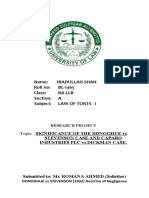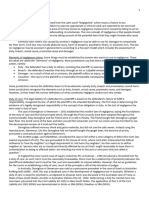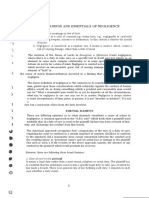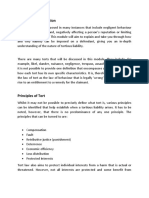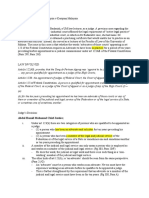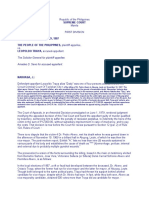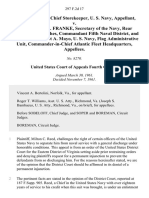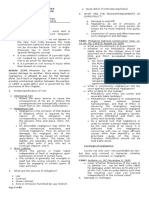Donoghue v. Stevenson
Donoghue v. Stevenson
Uploaded by
Amirah AmirahCopyright:
Available Formats
Donoghue v. Stevenson
Donoghue v. Stevenson
Uploaded by
Amirah AmirahOriginal Description:
Copyright
Available Formats
Share this document
Did you find this document useful?
Is this content inappropriate?
Copyright:
Available Formats
Donoghue v. Stevenson
Donoghue v. Stevenson
Uploaded by
Amirah AmirahCopyright:
Available Formats
Donoghue v Stevenson (1932) AC 562
Chapter 4 (page 165)
Relevant facts
On 26 August 1928, May Donoghue met a friend at a café in Paisley. The friend ordered
and paid for a bottle of ginger of beer for Donoghue. When the bottle arrived, the waiter
poured a portion into a glass tumbler. Donoghue drank the contents of the tumbler.
When Donoghue’s friend poured the rest of the bottle into the tumbler, the remains of a
partially decomposed snail fell out. The ginger beer had been packaged in an opaque
bottle, and therefore the presence of the snail had not been evident to Donoghue or the
staff at the café.
Donoghue suffered from shock from the nauseating sight of the snail. She also suffered
severe gastro-enteritis as a result of consuming the ginger beer. She sued the
manufacturer of the ginger beer, David Stevenson, for £500 in damages.
At first instance the Judge found in favour of Donoghue. That decision was overturned
on appeal to the Second Division of the Court of Session in Scotland. Donoghue
appealed to the House of Lords.
Legal issue
Did Stephenson owe a duty of care to Donoghue even though there was no contract
between them, and there was no fraud?
Decision
On 26 May 1932, a majority of the House of Lords held that when an article of food,
medicine, etc is sold by a manufacturer to a distributor in circumstances which prevent
the distributor or the ultimate purchaser or consumer from discovering by inspection any
defect, the manufacturer is under a legal duty to the ultimate purchaser or consumer to
take reasonable care to ensure that the article is free from any defect likely to cause
injury to health. According to Lords Atkin, Thankerton and MacMillan (Lords Buckmaster
and Tomlin dissenting), this duty is owed even if there is no contract between the
manufacturer and the consumer.
Lord Atkin (at 579-580) discussed the absence of a general statement of the
circumstances in which a duty of care will arise:
It is remarkable how difficult it is to find in the English authorities statements of
general application defining the relations between parties that give rise to the duty.
The Courts are concerned with the particular relations which come before them in
actual litigation, and it is sufficient to say whether the duty exists in those
circumstances. The result is that the Courts have been engaged upon an elaborate
classification of duties as they exist in respect of property, whether real or
personal, with further divisions as to ownership, occupation or control, and
distinctions based on the particular relations of the one side or the other, whether
manufacturer, salesman or landlord, customer, tenant, stranger, and so on.
In this way it can be ascertained at any time whether the law recognises a duty,
but only where the case can be referred to some particular species which has
been examined and classified. And yet the duty which is common to all the cases
where liability is established must logically be based upon some element common
to the cases where it is found to exist.
Lord Atkin then (at 580) set out his general conception of when a duty of care is owed
(emphasis added):
At present I content myself with pointing out that in English law there must be, and
is, some general conception of relations giving rise to a duty of care, of which the
particular cases found in the books are but instances. The liability for negligence,
whether you style it such or treat it as in other systems as a species of ‘culpa,’ is
no doubt based upon a general public sentiment of moral wrongdoing for which the
offender must pay. But acts or omissions which any moral code would censure
cannot in a practical world be treated so as to give a right to every person injured
by them to demand relief. In this way rules of law arise which limit the range of
complainants and the extent of their remedy. The rule that you are to love your
neighbour becomes in law, you must not injure your neighbour; and the lawyer’s
question, Who is my neighbour? receives a restricted reply. You must take
reasonable care to avoid acts or omissions which you can reasonably foresee
would be likely to injure your neighbour. Who, then, in law is my neighbour? The
answer seems to be - persons who are so closely and directly affected by my act
that I ought reasonably to have them in contemplation as being so affected when I
am directing my mind to the acts or omissions which are called in question.
Significance
This decision created a new category of duty of care, being that owed by a
manufacturer of goods to the ultimate user of the goods. However, it is also credited
with establishing the modern form of the tort of negligence by setting out the general
principles for determining whether a person owes a duty of care to another. Prior to this
decision, it was only recognised that a duty of care was owed in very specific
circumstances, such as where a binding contract existed between the parties or the
particular article was dangerous. The general conception of duty of care stated by Lord
Atkin has since been used to identify numerous categories of situation when a duty of
care will arise.
You might also like
- Stock Redemption AgreementDocument7 pagesStock Redemption Agreementpeaser0712100% (1)
- Law of Tort: Donoghue V Stevenson (1932)Document3 pagesLaw of Tort: Donoghue V Stevenson (1932)Sermon Md. Anwar HossainNo ratings yet
- Donoghue V StevensonDocument4 pagesDonoghue V Stevensonkapil shrivastavaNo ratings yet
- Law of TortDocument4 pagesLaw of TortAnastasiaPavlouNo ratings yet
- Jan 2018Document8 pagesJan 2018Amirah AmirahNo ratings yet
- Cases in TortDocument5 pagesCases in TortAmirah Amirah100% (1)
- Wazifa Names of GodDocument25 pagesWazifa Names of GodIbrahima SakhoNo ratings yet
- LAWS1700 Donoghue V Stevenson - NotesDocument4 pagesLAWS1700 Donoghue V Stevenson - NotesHanh Trang NguyenNo ratings yet
- Tort CW 2Document4 pagesTort CW 2tracyharono18No ratings yet
- DR Sumaili Law of Torts ModuleDocument27 pagesDR Sumaili Law of Torts ModuleDaniel ChansaNo ratings yet
- Donguee vs. StevensonDocument16 pagesDonguee vs. StevensonNitish ThakurNo ratings yet
- Donoghue Stevenson PDFDocument5 pagesDonoghue Stevenson PDFFarhanis GhaniNo ratings yet
- Law B262F Business Law I: Lecturers: Lana Tang (OUHK)Document20 pagesLaw B262F Business Law I: Lecturers: Lana Tang (OUHK)Kasem AhmedNo ratings yet
- Torts ProjectDocument22 pagesTorts ProjectSakshi NayakNo ratings yet
- Name: Ibadullah Shah Roll No: BL-1465 Class: Ba-Llb Section: A Subject: Law of Torts - IDocument6 pagesName: Ibadullah Shah Roll No: BL-1465 Class: Ba-Llb Section: A Subject: Law of Torts - IIbadullah RashdiNo ratings yet
- Duty of CareDocument19 pagesDuty of CareGulRukh NafeesNo ratings yet
- NegligenceDocument8 pagesNegligenceImti LemturNo ratings yet
- The Case Group IIDocument15 pagesThe Case Group IIMartha Winda Rizky SianiparNo ratings yet
- Case StudyDocument6 pagesCase StudyIbadullah RashdiNo ratings yet
- Tort AssignmentDocument4 pagesTort AssignmentNghcd100% (1)
- Negligence-TORTS NOTESDocument50 pagesNegligence-TORTS NOTESMusa MomohNo ratings yet
- DONOGHUE VS STEVENSON PatooDocument21 pagesDONOGHUE VS STEVENSON PatoopatNo ratings yet
- Unit-Iii NegligenceDocument56 pagesUnit-Iii NegligenceDivyank DewanNo ratings yet
- English Tort LawDocument8 pagesEnglish Tort LawBabar KhanNo ratings yet
- Tort 1 Case SummariesDocument20 pagesTort 1 Case SummariestwyanaNo ratings yet
- Donoghue Vs StevensonDocument1 pageDonoghue Vs StevensonJagdish PradhanNo ratings yet
- Negligence and Strict Liability. Notes PDFDocument58 pagesNegligence and Strict Liability. Notes PDFWangalya EdwinNo ratings yet
- Tort Law LecturesDocument235 pagesTort Law LecturesNavin SoborunNo ratings yet
- Basic Principles of The Law of TortDocument6 pagesBasic Principles of The Law of TortEdwin OlooNo ratings yet
- Psycriatric InjuryDocument2 pagesPsycriatric InjuryBASIT NAZIRNo ratings yet
- Donoghue V StevensonDocument6 pagesDonoghue V StevensonSaleha Waqar100% (1)
- Extra Case Law 2022-2023 - Contract and Tort Law 2Document41 pagesExtra Case Law 2022-2023 - Contract and Tort Law 2RodrigoNo ratings yet
- 2023 Negligence Notes Stream cDocument73 pages2023 Negligence Notes Stream cwannyanajacklineNo ratings yet
- Donoghue (Or M'Alister) V Stevenson Is One of TheDocument12 pagesDonoghue (Or M'Alister) V Stevenson Is One of TheSneha SinghNo ratings yet
- Imani Y. Majenda - Breach of Duty of CareDocument8 pagesImani Y. Majenda - Breach of Duty of CareImani MajendaNo ratings yet
- Tort PPT 1Document9 pagesTort PPT 1khushipagarwal17No ratings yet
- Law AssignmentDocument4 pagesLaw AssignmentMakhdoom Nasir HussainNo ratings yet
- The Applicability of The Doctrine of Res PDFDocument13 pagesThe Applicability of The Doctrine of Res PDFChito BarsabalNo ratings yet
- HANDOUT 13: Principles in Donoghue vs. StevensonDocument1 pageHANDOUT 13: Principles in Donoghue vs. StevensonStelaNo ratings yet
- 17 NegligenceDocument33 pages17 Negligence2024385481No ratings yet
- The Duty of Care in Irish Tort LawDocument4 pagesThe Duty of Care in Irish Tort LawLongku dieudonneNo ratings yet
- Case Study Donoghue V StevensonDocument8 pagesCase Study Donoghue V StevensonNikhilNo ratings yet
- Sreeja Banerjee 1 20200919033116Document14 pagesSreeja Banerjee 1 20200919033116sreeja.banerjee.097No ratings yet
- NEGLIGENCEDocument7 pagesNEGLIGENCEPolycarp DavidNo ratings yet
- 8 Fascinating Cases and Legal Ideas For The Law EnthusiastDocument7 pages8 Fascinating Cases and Legal Ideas For The Law EnthusiastMary RoseNo ratings yet
- ASSIGNMENT II - TortsDocument4 pagesASSIGNMENT II - TortsriyaNo ratings yet
- 1823 - Contracts IIDocument18 pages1823 - Contracts IIshivangi paliwalNo ratings yet
- Assignment 1 NegligenceDocument12 pagesAssignment 1 NegligenceKimberly Mwansa Mushota100% (1)
- Donoghue V Stevenson - Contract Law 1Document2 pagesDonoghue V Stevenson - Contract Law 1R Jon100% (1)
- Duty of CareDocument6 pagesDuty of CareSean GabrielNo ratings yet
- LAWS1111 Lecture 5 - Legal Reasoning and Case AnalysisDocument8 pagesLAWS1111 Lecture 5 - Legal Reasoning and Case AnalysisThoughts of a Law Student0% (1)
- Tort Exam Establishing A Duty of Care in A Novel Situation Is A Matter of Policy Rather Than Justice.'Document4 pagesTort Exam Establishing A Duty of Care in A Novel Situation Is A Matter of Policy Rather Than Justice.'Rosario HerreraNo ratings yet
- Fundamental RightsDocument7 pagesFundamental RightsH.D.N.S. JAYAWARDENA100% (2)
- Tort Law NegligenceDocument5 pagesTort Law NegligenceVishnu SarasanNo ratings yet
- Unit 4 Section 1Document8 pagesUnit 4 Section 1egyaNo ratings yet
- Enquiry Into Negligence As The Most Common Type of Tort and It's Encompassing NatureDocument7 pagesEnquiry Into Negligence As The Most Common Type of Tort and It's Encompassing NatureHarsshNo ratings yet
- res ipsa LoquiturDocument15 pagesres ipsa LoquiturSelvaa SelvaaNo ratings yet
- Lecture 6 (LSL) TortDocument4 pagesLecture 6 (LSL) TortOsamah BakhshNo ratings yet
- Tort Law & The Law of Negligence: Walter Ferix Silvester & Legal Learning Labs Pte LTDDocument169 pagesTort Law & The Law of Negligence: Walter Ferix Silvester & Legal Learning Labs Pte LTDCarlos zobelNo ratings yet
- Contribution Between Joint Tort FeasorsDocument8 pagesContribution Between Joint Tort FeasorsKulsum KhanNo ratings yet
- ResDocument9 pagesResShivam ShuklaNo ratings yet
- Tort FahimDocument14 pagesTort Fahimfahim3chy3No ratings yet
- 4th Semester Cia 3 Law and EcoDocument4 pages4th Semester Cia 3 Law and Ecokumari.pragatiNo ratings yet
- Discussion 6Document7 pagesDiscussion 6Amirah AmirahNo ratings yet
- Summary Cases IIDocument12 pagesSummary Cases IIAmirah AmirahNo ratings yet
- Summary Case 5Document11 pagesSummary Case 5Amirah AmirahNo ratings yet
- Summary Case 1Document8 pagesSummary Case 1Amirah AmirahNo ratings yet
- Case 6Document8 pagesCase 6Amirah AmirahNo ratings yet
- Case Summary 3Document8 pagesCase Summary 3Amirah AmirahNo ratings yet
- Attributional Style, Self-Esteem, and Celebrity Worship: Media Psychology April 2007Document20 pagesAttributional Style, Self-Esteem, and Celebrity Worship: Media Psychology April 2007Amirah AmirahNo ratings yet
- Cases On JudiciaryDocument8 pagesCases On JudiciaryAmirah AmirahNo ratings yet
- Celebrity Worship Addiction and CriminalityDocument14 pagesCelebrity Worship Addiction and CriminalityAmirah AmirahNo ratings yet
- Azmi-Sharom (Seditious Act)Document23 pagesAzmi-Sharom (Seditious Act)Amirah AmirahNo ratings yet
- Law437 PDFDocument4 pagesLaw437 PDFAmirah AmirahNo ratings yet
- What Is An Implied Term'? With Reference To Cases, Explain TWO (2) Instances When A Term Is Implied Into A Contract For The Sale of A CarDocument4 pagesWhat Is An Implied Term'? With Reference To Cases, Explain TWO (2) Instances When A Term Is Implied Into A Contract For The Sale of A CarAmirah AmirahNo ratings yet
- Tan Boon Kean VDocument7 pagesTan Boon Kean VAmirah AmirahNo ratings yet
- PP Vs Kok Wah KuanDocument18 pagesPP Vs Kok Wah KuanAmirah AmirahNo ratings yet
- Dec 2013Document4 pagesDec 2013Amirah AmirahNo ratings yet
- Dato' Seri Syed Hamid Syed Jaafar Albar (Menteri Dalam Negeri) v. SIS Forum (Malaysia)Document11 pagesDato' Seri Syed Hamid Syed Jaafar Albar (Menteri Dalam Negeri) v. SIS Forum (Malaysia)Amirah AmirahNo ratings yet
- Law of Contract: Prepared By: Norazla Abdul WahabDocument86 pagesLaw of Contract: Prepared By: Norazla Abdul WahabAmirah AmirahNo ratings yet
- Tort List of Cases According To The Topics 2016Document11 pagesTort List of Cases According To The Topics 2016Amirah AmirahNo ratings yet
- Disciplinary Action PolicyDocument3 pagesDisciplinary Action Policyhussain100% (1)
- Fusepoint Power of AttorneyDocument1 pageFusepoint Power of AttorneyboduntayNo ratings yet
- BDO Vs RepublicDocument53 pagesBDO Vs RepublicReena AlbanielNo ratings yet
- Randy Bellows Interview TranscriptDocument2 pagesRandy Bellows Interview TranscriptAndrew RiccioNo ratings yet
- United States District Court For The District of Puerto RicoDocument14 pagesUnited States District Court For The District of Puerto RicoJohn E. MuddNo ratings yet
- Cap. 571 Securities and Futures Ordinance s277 298 384Document9 pagesCap. 571 Securities and Futures Ordinance s277 298 384Anonymous RHkELDZ8AVNo ratings yet
- Federal Class Action Lawsuit Charging Illegal Use of Vexatious Litigant Law Against Family Court Parents by Superior Court Judges: Judge Jaime Roman Sacramento Superior Court - Judge Robert Hight - Judge James Mize Sacramento County - Judge Tani Cantil-Sakauye Defendant Supreme Court of California - California Judicial Council - Commission on Judicial Performance Victoria Henley Director-Chief Counsel - Third District Court of Appeal Presiding Justice Vance RayeDocument11 pagesFederal Class Action Lawsuit Charging Illegal Use of Vexatious Litigant Law Against Family Court Parents by Superior Court Judges: Judge Jaime Roman Sacramento Superior Court - Judge Robert Hight - Judge James Mize Sacramento County - Judge Tani Cantil-Sakauye Defendant Supreme Court of California - California Judicial Council - Commission on Judicial Performance Victoria Henley Director-Chief Counsel - Third District Court of Appeal Presiding Justice Vance RayeCalifornia Judicial Branch News Service - Investigative Reporting Source Material & Story IdeasNo ratings yet
- Declaration PDFDocument1 pageDeclaration PDFJatinder Singh TanejaNo ratings yet
- Supreme Court: The Solicitor General For Plaintiff-Appellee. Amadeo D. Seno For Accused-AppellantDocument5 pagesSupreme Court: The Solicitor General For Plaintiff-Appellee. Amadeo D. Seno For Accused-AppellantRegan SabateNo ratings yet
- United States v. Georgia Waste Systems, Inc. and Raymond E. Dinkle, 731 F.2d 1580, 11th Cir. (1984)Document5 pagesUnited States v. Georgia Waste Systems, Inc. and Raymond E. Dinkle, 731 F.2d 1580, 11th Cir. (1984)Scribd Government DocsNo ratings yet
- Sections 21-3 Under Indian Divorce ActDocument16 pagesSections 21-3 Under Indian Divorce Actkhadija khanNo ratings yet
- Notes On Identifying AccusedDocument37 pagesNotes On Identifying AccusedrjapsNo ratings yet
- Self-Actualization and The Tragedy of BeautyDocument17 pagesSelf-Actualization and The Tragedy of BeautyEdward SalazarNo ratings yet
- Van Dorn Vs Romillo-DigestDocument3 pagesVan Dorn Vs Romillo-DigestanamergalNo ratings yet
- Swaziland Prisons Act (2847)Document29 pagesSwaziland Prisons Act (2847)vuminyembe100% (3)
- Sharad Birdhi Chand Sarda Vs State of Maharashtra On 17 July, 1984 PDFDocument80 pagesSharad Birdhi Chand Sarda Vs State of Maharashtra On 17 July, 1984 PDFTIRUNAGIRI PRANAV SAINo ratings yet
- Asian Terminals vs. First LepantoDocument33 pagesAsian Terminals vs. First LepantoKimberly Pearl AlvarezNo ratings yet
- United States Court of Appeals Fourth CircuitDocument15 pagesUnited States Court of Appeals Fourth CircuitScribd Government DocsNo ratings yet
- (G. R. No. L-10214, April 28, 1958) : Felix, J.Document3 pages(G. R. No. L-10214, April 28, 1958) : Felix, J.JB AndesNo ratings yet
- Carlos Eduardo Lopez Romero - US IndictmentDocument17 pagesCarlos Eduardo Lopez Romero - US IndictmentMXNo ratings yet
- Appeal Letter TemplateDocument4 pagesAppeal Letter TemplateTet DomingoNo ratings yet
- People VS BatinDocument2 pagesPeople VS Batinvincent nifas100% (2)
- Torts and DamagesDocument61 pagesTorts and DamagespasmoNo ratings yet
- General Milling Corp Vs CasioDocument4 pagesGeneral Milling Corp Vs CasioRZ ZamoraNo ratings yet
- SeniorpaperDocument6 pagesSeniorpaperapi-356193849No ratings yet
- GR No L-23305 Lagman v. City of ManilaDocument5 pagesGR No L-23305 Lagman v. City of ManilaKristela AdraincemNo ratings yet
- PD 1866 - 6 Misolas v. Panga 1990Document11 pagesPD 1866 - 6 Misolas v. Panga 1990csalipio24No ratings yet
- United States v. Robert Russell Dye, SR., 7 F.3d 227, 4th Cir. (1993)Document5 pagesUnited States v. Robert Russell Dye, SR., 7 F.3d 227, 4th Cir. (1993)Scribd Government DocsNo ratings yet














